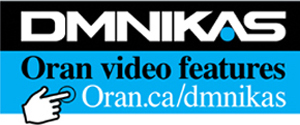Logan Poirier, on his third training drive this spring, was in the sulky on Saturday morning to take Business Time for a jog at Inverness Raceway.
-by Bill Dunphy
With six weeks to go before the official start date of the 2020 harness racing season, the president of Inverness Raceway says they will be ready to go once it is determined it is safe to do so.
“Everything is pretty much at a standstill right now,” said Barry Watson on Monday. “But we’ll be ready; when things start to lighten up, things are going to move like wildfire.”
Harness racing is on hold at most North American tracks, including all three Nova Scotia tracks, as we ride out the effects of the COVID-19 pandemic.
Watson said in the meantime, the industry and local owners and trainers are working to maintain a state of readiness if and when they are able to race again.
“The Nova Scotia Harness Racing Association is trying to move things along. The budget was approved and the purse money is in place,” he said.
The Nova Scotia government, through the Department of Agriculture, provides a $1 million contribution for purses that is divided between Inverness, Northside Downs and Truro Raceway. The split is roughly 45 per cent to Truro, 35 per cent to Northside, and 20 per cent to Inverness. After the harness racing commission takes its cut, that usually means Inverness receives approximately $140,000 for purses.
“We are still required to raise 20 per cent ourselves, which is difficult at the moment with no bingo, no tri-cash, and no income,” said Watson, who is looking into some of the funding programs the federal government is offering during the pandemic.
Watson said Inverness Raceway was hit this year with a $28,000 bill from the Canada Revenue Agency for an accounting mistake made several years ago that resulted in no payroll deductions or GST payments being made.
Watson said the raceway is still in a good position financially. “We had no idea that this money was owed. They (the CRA) froze our accounts and took their money. If only for this, after two years doing this, we would have been in the black by about $10,000.”
Watson said the raceway made up the difference by completely shutting the parimutuel building down this winter.
Because of the ban on large gatherings, Inverness Raceway still hasn’t held its annual general meeting and election of officers, normally held in April. As well, the 2019 awards banquet has also been scratched.
“We didn’t have a meeting so we will have to organize a virtual meeting or something.”
Watson said even if the raceway misses its June 7th start, it would still be possible to start in July, tacking on the missed race dates to some vacant Wednesday dates.
“The Atlantic Sires Stakes have approved stake races for both our Wednesday and Sunday races during Gathering Week, which is good news,” said Watson.
He said even if the season is cancelled altogether, he believes the horse people in the county will continue to raise and train horses.
“The horse population isn’t great, but there’s enough to race, and there are lots of babies running around. I doubt if we’ll lose horses, because who will you lose them to? Nobody will be buying and some owners will travel to keep their horses,” he said, noting that Charlottetown and other tracks might open later in the season if Inverness is unable to go this spring.
In Ontario, an agreement was reached between Ontario Racing and OLG (Ontario Lottery and Gaming) for horse people to access purse funds that are remaining under their provincial funding agreement.
As an interim measure, owners must file an application and meet these eligibility requirements:
Horses must be trained and raced by an Ontario-based trainer with a valid AGCO license;
Certification that the horse is resident in Ontario, or has completed a Stall Application for the 2020 race season, or is otherwise verified to be coming to Ontario for the 2020 race season;
The horse’s first start following the resumption of racing in Ontario must be at an Ontario track, unless otherwise approved by Ontario Racing, and;
Horses must be at least three years old, and either have not yet raced or have raced since January 1st, 2019.
According to the agreement, standardbred owners would receive $1,000 a month for April and May to cover an estimated half of the monthly costs associated with boarding, feed and training fees (veterinary, blacksmith, shipping, and other fees are not included in the estimate).
Watson said Ontario races for larger purses than in Nova Scotia, but didn’t rule out the possibility of the industry seeking a similar arrangement with the provincial government should racing be cancelled here this season.
Watson said horses are continuing to be trained in Inverness and Port Hood. He said the horse people are doing so in a safe matter.
“It’s amazing how people adapt to changes. There’s a group that go to the barns between 6:30 and 8 a.m., another group from 8-10:30 and another group in the afternoon,” he said, adding it is easy for people to keep their distances because the large blue barn is divided into four separate barns that are not connected.
No matter how the harness racing season plays out this year, Watson said we have to remain patient until the state of emergency is over.
“We just have to grin and bear it.”






